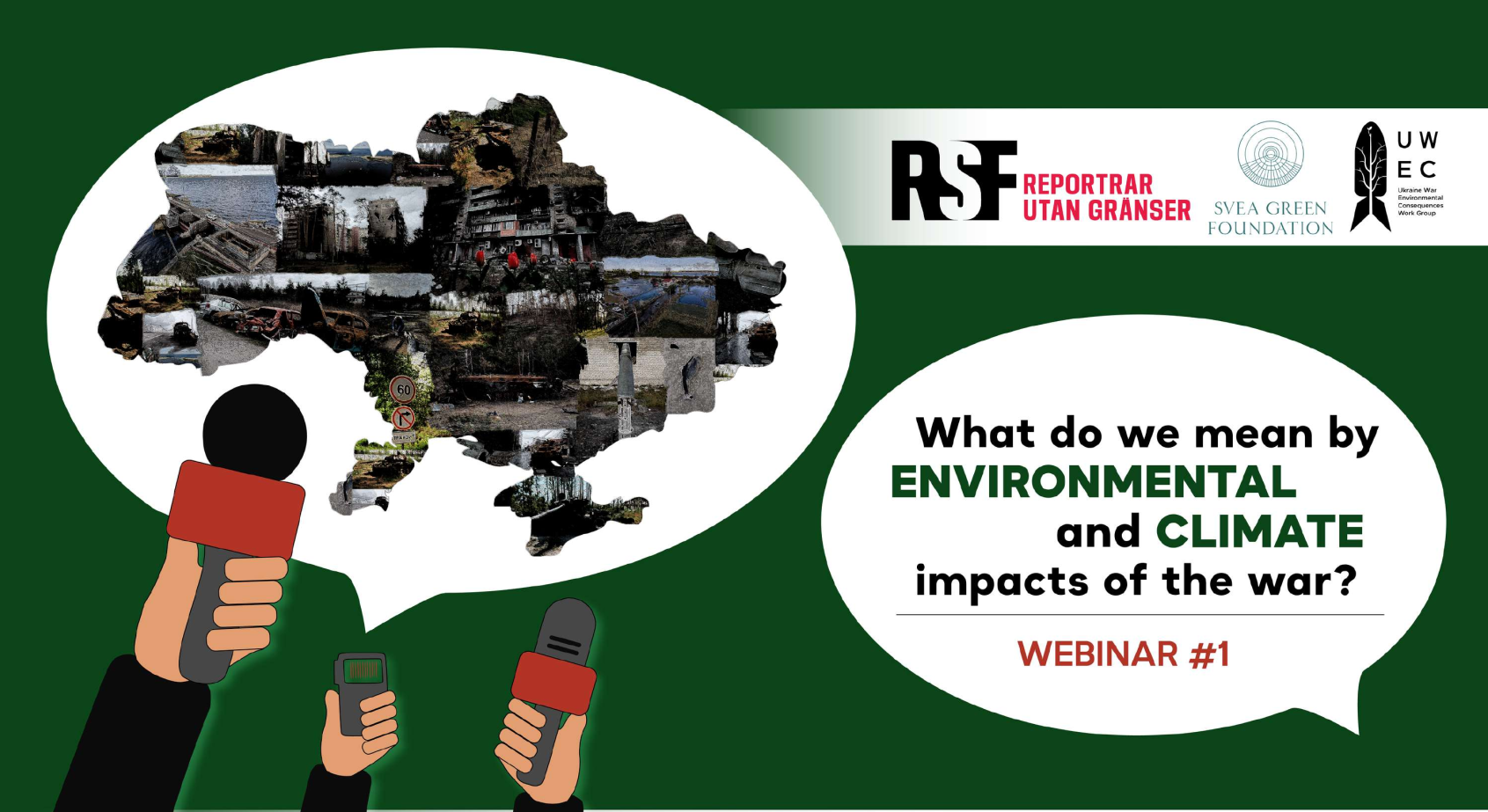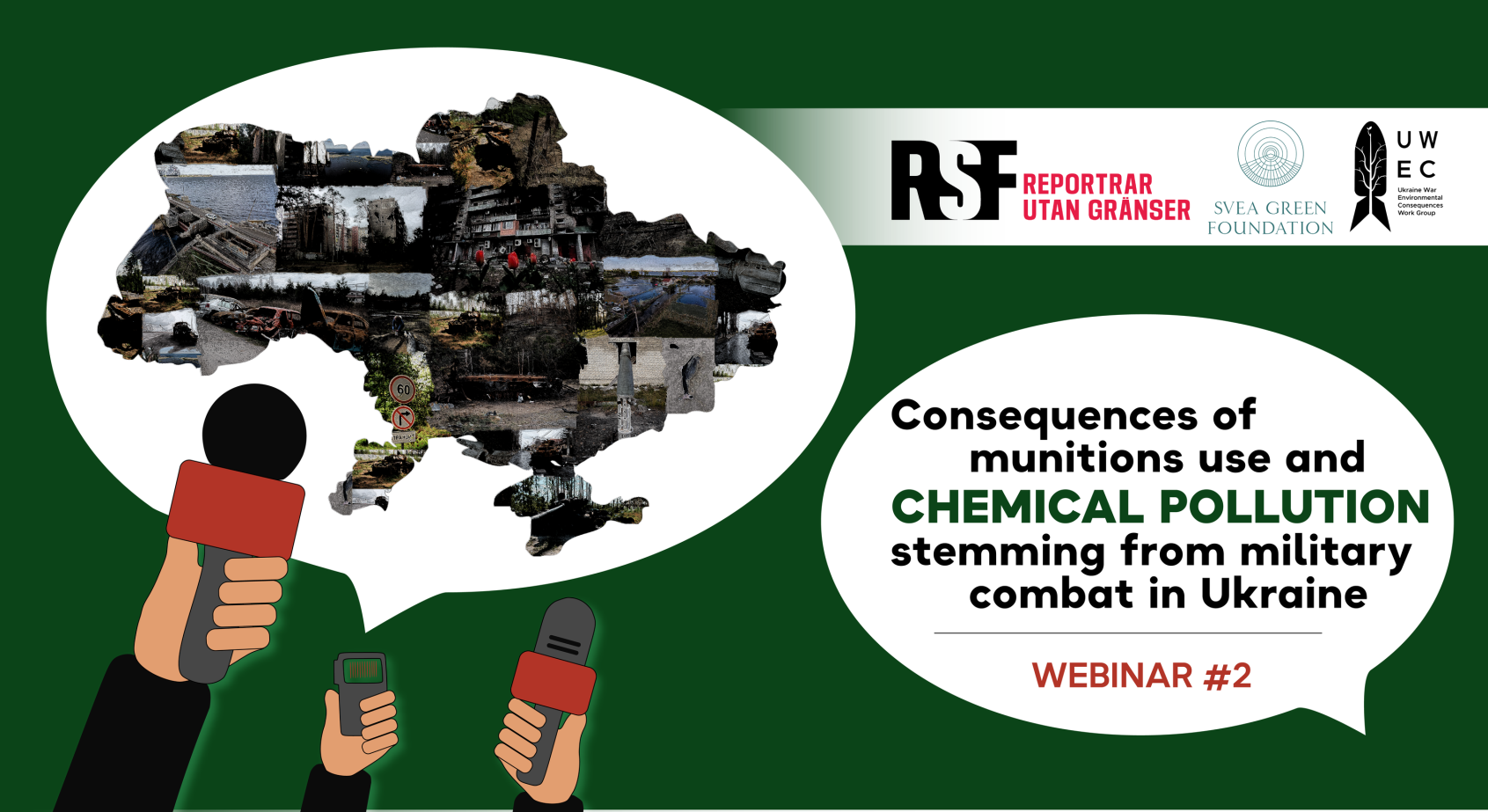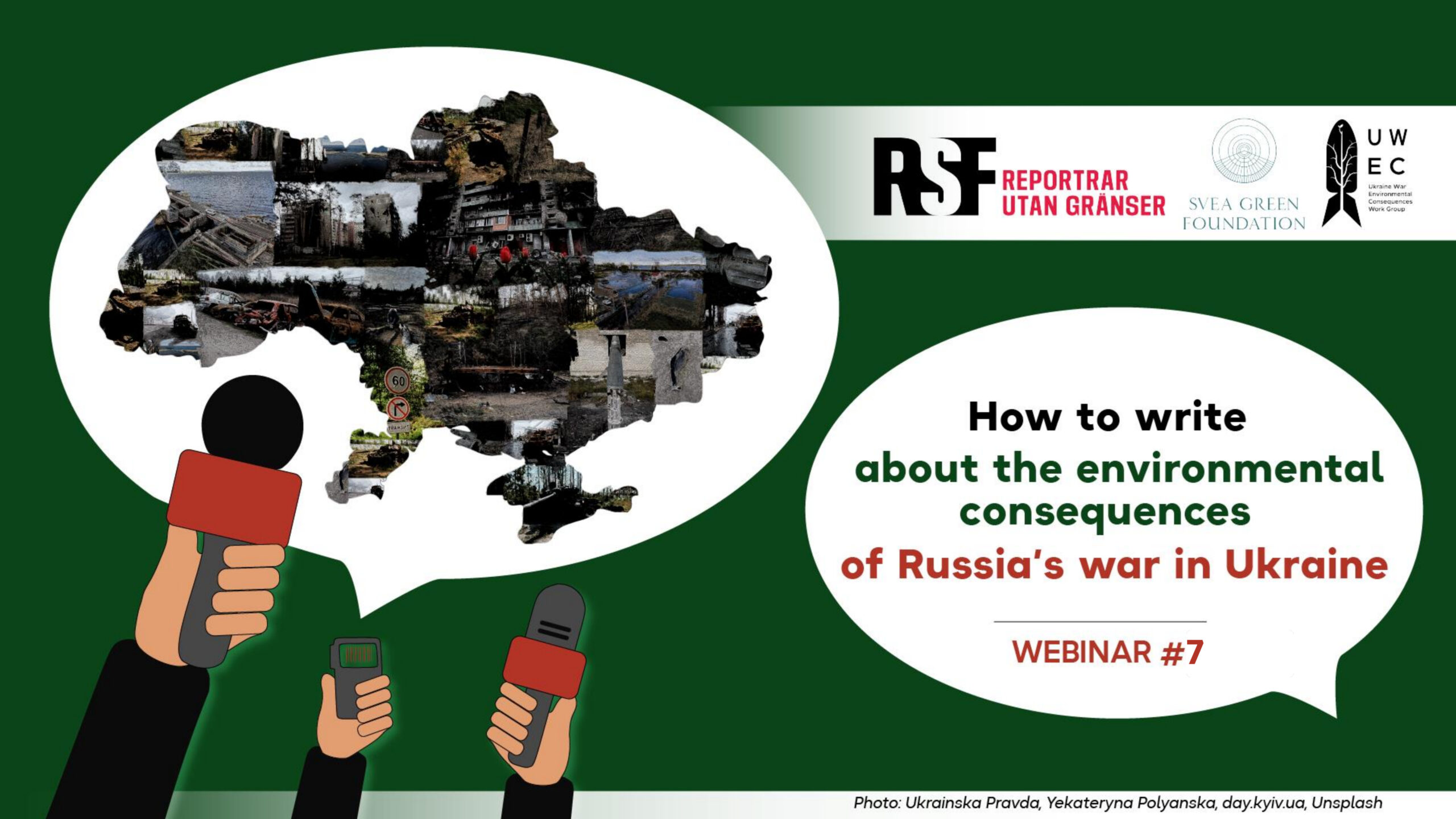Viktoria Hubareva
In 2023 and 2024, UWEC Work Group, together with Reporters without Borders Sweden and the Svea Green Foundation, conducted seven webinars for journalists on the environmental and climate impacts of Russia’s invasion of Ukraine. Our experts were also invited to speak at virtual meetings hosted by other institutions.
In this overview, you will find more information about our webinars as well as links to all recordings. Additional information is also available on our website.
Webinar 1: What do we mean by environmental and climate impacts of the war in Ukraine?
“Half of Ukraine’s scientific centers are under occupation or in ruins. The material base of universities and nature reserves has been seriously impacted. Many young scientists have left for the West and some of them will not return. But science goes on!”
Oleksiy Vasyliuk
The first webinar in our series examining the environmental and climate consequences of the Russian invasion of Ukraine, conducted jointly with Reporters Without Borders, took place in May 2023. Among the issues covered during the webinar is wartime life in the scientific community.
UWEC experts Oleksiy Vasyliuk and Eugene Simonov discussed the direct and indirect environmental and climate consequences of the war in Ukraine, including chemical pollution, destruction of ecosystems and biodiversity, changes in national environmental and climate policies of Ukraine, Russia, and other countries in the world, and the impact of the war on international cooperation as it relates to environmental and climate protection, as well as the main scenarios and paths for Ukraine’s “green” reconstruction when hostilities come to an end.
Webinar 2: Consequences of munitions use and chemical pollution stemming from military combat in Ukraine
“Everything that you see during an explosion immediately enters the atmosphere.”
Oleksiy Vasyliuk
Oleksiy Vasyliuk, director of Ukrainian Nature Conservation Group and UWEC expert, told meeting participants about the “products” of using ammunition and chemical pollution during military operations in Ukraine: military waste, heavy metals soil contamination, air pollution. Oleksiy also spoke about possibilities for restoring ecosystems after hostilities.
Webinar 3: Environmental consequences of the Kakhovka Dam explosion
“Dams and dikes have been used as weapons of war since ancient times. Generals changed the path of rivers to flood enemy fortresses and troops or, conversely, deprive them of water.”
Eugene Simonov
This webinar took place in June 2023, just over a week after the Russian terrorist attack on the Kakhovka hydropower plant and using data available at that time. It provided a comprehensive assessment and analysis of the consequences of the Kakhovka dam’s destruction in southern Ukraine.
- UWEC experts Oleksiy Vasyliuk and Eugene Simonov shared their assessments of the catastrophe’s consequences
- Bellona expert Dmitry Gorchakov gave his assessment of the effect of the dam’s destruction on Zaporizhzhia Nuclear Power Plant, located on the former shores of the Kakhovka reservoir
- Ukrainian environmental journalist Viktoria Hubareva described how the dam’s destruction at Kakhovka Hydropower Plant was being covered in the Ukrainian media.
Webinar 4: Persecution of environmental activists in Russia and Belarus prior to and following the military invasion of Ukraine
“In 2022, at least 261 administrative citations were drawn up against environmental defenders. The citations show that activists were fined at least 2,479,000 rubles.”
Marina Dubina
The fourth webinar described the persecution of environmental activists in Belarus and Russia before and after the outbreak of the full-scale war in Ukraine, as well as how the Russian military invasion influenced persecution of activists. Speakers included:
- Marina Dubina, Ecodom expert
- Vitaliy Servetnik of Environmental Crisis Group, an organization which, among other objectives, monitors rights violations and persecution of environmental activists in Russia.
Webinar 5: Gathering and analyzing data on the environmental consequences of Russia’s invasion of Ukraine
“The probability of an accident at any single large dam in peacetime is relatively small. But this is more than offset by casualties and destruction in the event of an “unlikely” attack.”
Eugene Simonov
Presenting experts spoke discussed gathering and verifying data on environmental damage:
- Aleksandr Opanasenko, Ukrainian community organization Ecoaction, spoke about Ecoaction’s experience organizing documentation of environmental damage and environmental crimes, including the creation of interactive maps.
- Wim Zwijnenburg, Paxforpeace, spoke about the use of Open Source Intelligence (OSINT) techniques, remote-sensing technology, and Earth observation systems to analyze the war’s environmental consequences.
- Linas Svolkinas, Conflict and Environment Observatory (CEOBS), spoke about remote data collection, verification of publicly available data, “gaps” in available information about environmental damage and the possibility of eliminating those gaps, as well as the peculiarities of the war in Ukraine in terms of damage to the environment environment.
Webinar 6: Green rebuilding of Ukraine
“To date, conversations about a green recovery have not included discussion of ecosystem restoration. This specific issue will be felt in other countries as consequences of the war.”
Oleksiy Vasyliuk
By the end of 2023, Ukraine’s information space surrounding the war began to shift. Whereas at the beginning of the full-scale invasion the conversation was mostly concerned with environmental consequences, today there is now more talk about a green recovery. The fifth webinar in the series was dedicated to this topic.
- Oleksiy Vasyliuk, director of the Ukrainian Nature Conservation Group and UWEC expert, spoke about the prospects for restoring Ukrainian ecosystems destroyed or damaged as a result of military operations and also highlighted potential environmental projects that could help restore the environment.
- Torsten Wöllert, a Brussels-based expert in environmental and energy-related issues serving on the European Commission’s Ukraine Support Group spoke about rebuilding Ukraine’s energy sector, including opportunities to develop renewable energy and international aid and initiatives.
Webinar 7: How to write about the environmental consequences of Russia’s war in Ukraine
“Even far from the frontline, environmental journalists in Ukraine must consider factors related to martial law. For those wanting to conduct fieldwork, you must understand the many legal and practical nuances to be safe and get the best results.”
Viktoria Hubareva
The last webinar in our series was dedicated to the work of journalists. During the conversation, presenters discussed collecting and verifying information about the environmental consequences of Russia’s invasion of Ukraine, as well as the specifics for international journalists working in Ukraine.
- Alexej Ovchinnikov, UWEC editor in chief and member of Green Network, spoke about searching the internet for information about the environmental consequences of military operations, potential information sources, and verification methods.
- Viktoria Hubareva, Ukrainian environmental journalist, spoke about the specifics of working in environmental journalism in Ukraine during wartime.
In addition to our webinar series (with support from Reporters Without Borders (Sweden) and Svea Foundation), UWEC experts and journalists were also invited to participate in other webinars around the world, including one in Australia.
“Ukraine has a small number of protected areas that occupy roughly 6.8% of the country’s total land area. Of these, almost half—44%—are either located in the occupation zone or have been damaged during hostilities. Unfortunately, this is true for Ukraine’s most valuable nature conservation areas.”
Oleksiy Vasyliuk
On 5 June 2023, celebrated as Environment Day, the University of New South Wales (Canberra, Australia) held a webinar entitled “Natural Cost of War”. UWEC experts gave a series of presentations.
- Anthony Burke, an environmental philosopher known for his study of the formation of international environmental law and management institutions, moderated the webinar. He devoted his brief report to nuclear safety at civilian sites and the reform of international law.
- Oleksiy Vasyliuk, director of the Ukrainian Nature Conservation Group and UWEC expert, spoke about the challenges faced by Ukraine’s nature reserves, national parks, and other protected areas.
- Eugene Simonov, UWEC expert and ecologist specializing in the conservation of freshwater ecosystems, environmental impacts of globalization, and the expansion of international cooperation between environmental NGOs, spoke about indirect environmental harm resulting from war.
- Angelina Davydova, UWEC expert and co-editor of UWEC, UN climate negotiations (UNFCCC) observer since 2008, member of the World Future Council, and co-host of the English-language podcast “Eurasian Climate Brief”, spoke about the connection between the war and the global climate agenda.
Stay tuned in 2024 for new webinars studying the environmental consequences of Russia’s invasion of Ukraine, the country’s green recovery, the impacts of war on the environmental movement, and much more.
Follow us on social media: Twitter, Facebook, Telegram.
Translated by Jennifer Castner







